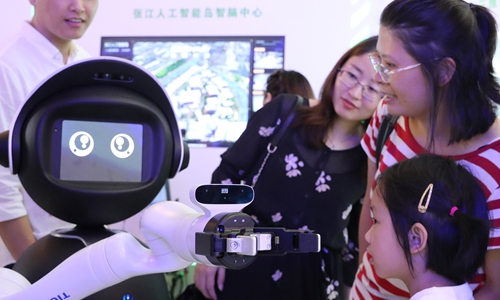HOME >> SOURCE
US tech export control could backfire: experts
By Wang Cong Source:Global Times Published: 2020/1/5 22:13:41

A booth of AI technology at the 6th China Electronic Information Expo held in Shenzhen, South China's Guangdong Province. Photo: VCG
Intensifying US restrictions on cooperation with China in emerging technologies such as artificial intelligence (AI) could undercut its own domestic industry by cutting off access to a vast market and database required to foster innovation, Chinese analysts said on Sunday.Although Washington's latest move of limiting AI software exports is not just aimed at Beijing but also other countries such as Russia, it underscores lingering tensions between the two biggest economic powers over a host of areas, despite a looming phase one trade agreement, analysts noted.
China must remain vigilant and be prepared for the worst, they said.
A new US rule set to take effect Monday will require US businesses that export some geospatial imagery software to countries other than Canada to obtain a license, according to the Reuters. The move is part of a broad effort to ban the export of sensitive technologies to rivals such as China, the report said.
"As many have already pointed out for months, these types of ban on normal technology cooperation do not help anybody," said Zuo Shiquan, an expert in AI at the Beijing-based China Center for Information Industry Development. "Sure, the use of certain software made by US businesses in China will be impacted, but the US will also suffer."
Lose-lose move
While some Chinese firms rely on their US counterparts for certain AI technologies, such as computer algorithms and applications, US companies also count on the massive Chinese market and big data for continuing innovation, according to Zuo. "The fact is that both sides need each other," he said.
Some in the US government also appeared aware of the lose-lose nature of the restrictions.
The New York Times reported on October 23 that a plan to restrict China's access to US technologies faced "stiff resistance" from some officials because of a fear that such moves could backfire. After the pushback, the White House narrowed its rules on exports of sophisticated technology to China in contrast to the much-tougher crackdown feared by US firms, Reuters reported on December 17.
Given the overall hostile US approach to China, more restrictions on technologies can be expected, said Chen Fengying, a research fellow at the China Institutes of Contemporary International Relations in Beijing.
"It is just wishful thinking that the US would give away its core technologies," Chen said.
China's rapid rise in critical technologies is supported by its own robust research and development rather than importing from the US, Chen asserted.
China is closing on the US in AI patent filings, according to the latest data from the World Intellectual Property Organization (WIPO): AI patents filed in the US reached 152,981 and 137,010 in China.

Visitors communicate with a robot displayed in the World Artificial Intelligence Conference in Shanghai in October. Photo: Xinhua
Negotiating tactic
While it was widely expected the US would increase restrictions on technology cooperation with China, the timing of the move prompted some Chinese analysts to suspect it as a trade negotiating tactic.
"By bringing this up right before the signing the phase one trade agreement, the US might want to give itself more leverage," said Chen.
US officials may want to put in place restrictions so they can be removed later in exchange for concessions from China, she suggested.
"This is a very familiar tactic," Chen said. "All the tariffs are the same case."
While it is still unknown whether technology will be included in the pending phase one trade agreement, disputes over technology have been a focal point of the trade war, with the US waging a crackdown against Chinese tech firms such as Huawei.
Chinese officials are demanding the US treat Chinese firms fairly and drop restrictions on tech exports to China, which might reduce the US trade deficit.
"Technology issues will certainly be discussed in the trade talks, but don't expect it to result in any meaningful change in the US stance," Chen said. "China must be prepared to move forward on its own."
Posted in: ECONOMY